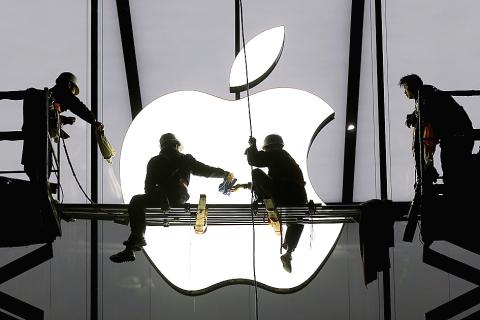Apple Inc, aiming to more than double its stores in China, is advertising openings for retail workers in five cities where it currently does not have any shops.
The Cupertino, California-based company is recruiting store workers in Guangzhou, Shenyang, Tianjin, Nanjing and Dalian, advertisements posted on the company’s Web site on Thursday showed. Apple spokeswoman Amy Bessette declined to comment beyond saying: “We haven’t announced stores in those areas.”
The push is part of Apple’s efforts to move beyond Hong Kong, Beijing and Shanghai, where the company already has the bulk of its China stores. CEO Tim Cook has said he expects China will eventually overtake the US to become its largest market. The company doubled iPhone unit sales in China in the final three months of last year.

Photo: Reuters
“The rising importance of the China market has forced Apple to accelerate its localization,” said Nicole Peng (彭路平), Shanghai-based analyst with researcher Canalys. “In order to be able to demonstrate the overall consumer experience, services and brand image, its retail stores cannot be limited to only Beijing, Shanghai, Shenzhen and Chengdu. Many Chinese would not be able to travel to those cities.”
Apple has said it plans to open 25 more stores in China by the middle of next year, including five before next month’s Lunar New Year holiday. Apple ended last year with 15 stores in China and Hong Kong, according to its Web site.
“When I look at China, I see an enormous market where there are more people graduating into the middle class than any nation on Earth in history, and just an incredible market where people want the latest technology and products that we’re providing,” Cook told analysts during an October last year conference call. “And so we’re investing like crazy in the market.”
Two new stores have since opened in Zhengzhou and Hangzhou, and a second Chongqing location is set to open today. Apple began looking for store managers for Tianjin and Shenyang in June last year.
Apple opened its first mainland China store in Beijing’s Sanlitun area in 2008 and added others in Shanghai, Chengdu, Chongqing, Wuxi, Shenzhen, Zhengzhou and Hangzhou. It also has three stores in Hong Kong, according to its Web site.
Apple struck a deal in 2013 to sell the iPhone through China Mobile Ltd, the world’s largest wireless carrier by users, and has been selling the smartphone through China Unicom (Hong Kong) Ltd since 2009 and China Telecom Corp since 2012.
Apple has 265 stores in the US with 30,000 employees, according to the company’s Web site.
Website 9to5 Mac previously reported that Apple was looking for workers in Nanjing and Dalian.

Intel Corp chief executive officer Lip-Bu Tan (陳立武) is expected to meet with Taiwanese suppliers next month in conjunction with the opening of the Computex Taipei trade show, supply chain sources said on Monday. The visit, the first for Tan to Taiwan since assuming his new post last month, would be aimed at enhancing Intel’s ties with suppliers in Taiwan as he attempts to help turn around the struggling US chipmaker, the sources said. Tan is to hold a banquet to celebrate Intel’s 40-year presence in Taiwan before Computex opens on May 20 and invite dozens of Taiwanese suppliers to exchange views

Application-specific integrated circuit designer Faraday Technology Corp (智原) yesterday said that although revenue this quarter would decline 30 percent from last quarter, it retained its full-year forecast of revenue growth of 100 percent. The company attributed the quarterly drop to a slowdown in customers’ production of chips using Faraday’s advanced packaging technology. The company is still confident about its revenue growth this year, given its strong “design-win” — or the projects it won to help customers design their chips, Faraday president Steve Wang (王國雍) told an online earnings conference. “The design-win this year is better than we expected. We believe we will win

Chizuko Kimura has become the first female sushi chef in the world to win a Michelin star, fulfilling a promise she made to her dying husband to continue his legacy. The 54-year-old Japanese chef regained the Michelin star her late husband, Shunei Kimura, won three years ago for their Sushi Shunei restaurant in Paris. For Shunei Kimura, the star was a dream come true. However, the joy was short-lived. He died from cancer just three months later in June 2022. He was 65. The following year, the restaurant in the heart of Montmartre lost its star rating. Chizuko Kimura insisted that the new star is still down

While China’s leaders use their economic and political might to fight US President Donald Trump’s trade war “to the end,” its army of social media soldiers are embarking on a more humorous campaign online. Trump’s tariff blitz has seen Washington and Beijing impose eye-watering duties on imports from the other, fanning a standoff between the economic superpowers that has sparked global recession fears and sent markets into a tailspin. Trump says his policy is a response to years of being “ripped off” by other countries and aims to bring manufacturing to the US, forcing companies to employ US workers. However, China’s online warriors